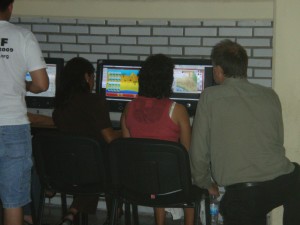Traditionally, open source software has relied primarily on asynchronous communication. While there are probably quite a few synchronous conversations on irc, most project discussions and decisions will happen on asynchronous channels like mailing lists, bug tracking tools and blogs.
I think there’s another reason for this. Synchronous communication is difficult for an open source project. For any project where people are distributed. Synchronous conversations are:
- Inconvenient. It’s hard to schedule synchronous meetings across time zones. Just try to pick a good time for Australia, Europe and California.
- Logistically difficult. It’s hard to schedule a meeting for people that are working on a project at odd hours that might vary every day depending on when they can fit in their hobby or volunteer job.
- Slower. If you have more than 2-3 people you need to get together every time you make a decision, things will move slower. I currently have a project right now that we are kicking off and the team wants to do everything in meetings. We had a meeting last week and one this week. Asynchronously we could have had several rounds of discussion by now.
- Expensive for many people. When I first started at GNOME, it was hard to get some of our board members on a phone call. They couldn’t call international numbers, or couldn’t afford an international call and they didn’t have enough bandwidth for an internet voice call. We ended up using a conference call line from one of our sponsor companies. Now it’s video.
- Logistically difficult. Mozilla does most of our meetings as video meetings. Video is still really hard for many people. Even with my pretty expensive, supposedly high end internet in a developed country, I often have bandwidth problems when participating in video calls. Now imagine I’m a volunteer from Nigeria. My electricity might not work all the time, much less my high speed internet.
- Language. Open source software projects work primarily in English and most of the world does not speak English as their first language. Asynchronous communication gives them a chance to compose their messages, look up words and communicate more effectively.
- Confusing. Discussions and decisions are often made by a subset of the project and unless the team members are very diligent the decisions and rationale are often not communicated out broadly or effectively. You lose the history behind decisions that way too.
There are some major benefits to synchronous conversation:
- Relationships. You build relationships faster. It’s much easier to get to know the person.
- Understanding. Questions and answers happen much faster, especially if the question is hard to formulate or understand. You can quickly go back and forth and get clarity on both sides. They are also really good for difficult topics that might be easily misinterpreted or misunderstood over email where you don’t have tone and body language to help convey the message.
- Quicker. If you only have 2-3 people, it’s faster to talk to them then to type it all out. Once you have more than 2-3, you lose that advantage.
I think as new technologies, both synchronous and asynchronous become main stream, open source software projects will have to figure out how to incorporate them. For example, at Mozilla, we’ve been working on how video can be a part of our projects. Unfortunately, they usually just add more synchronous conversations that are hard to share widely but we work on taking notes, sending notes to mailing lists and recording meetings to try to get the relationship and communication benefits of video meetings while maintaining good open source software project practices. I personally would like to see us use more asynchronous tools as I think video and synchronous tools benefit full time employees at the expense of volunteer involvement.
How does your open source software project use asynchronous and synchronous communication tools? How’s the balance working for you?











